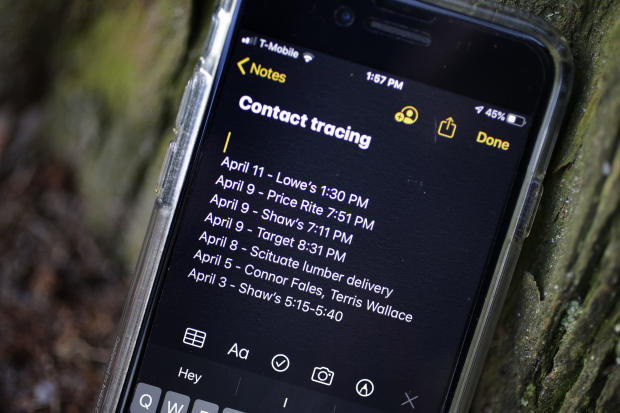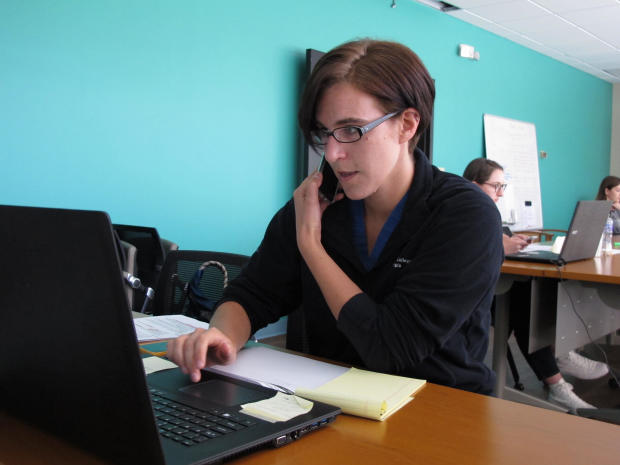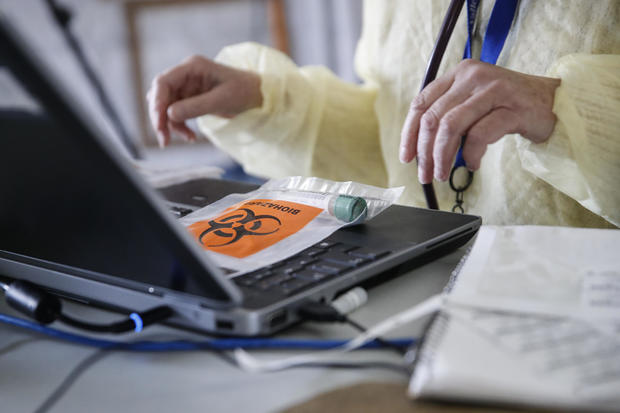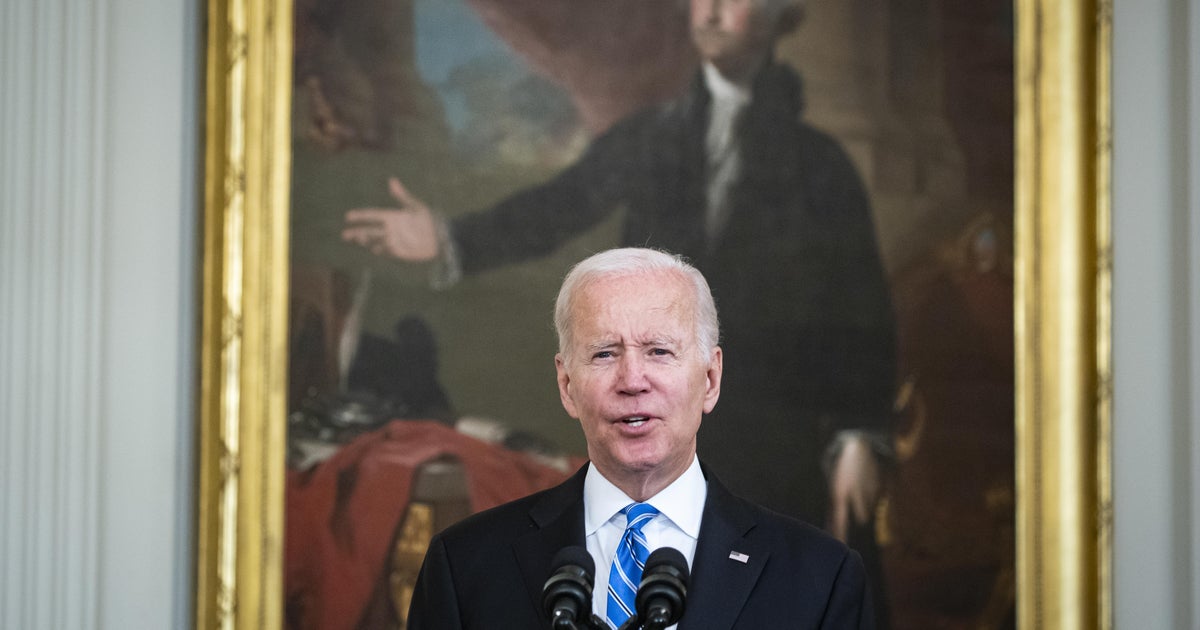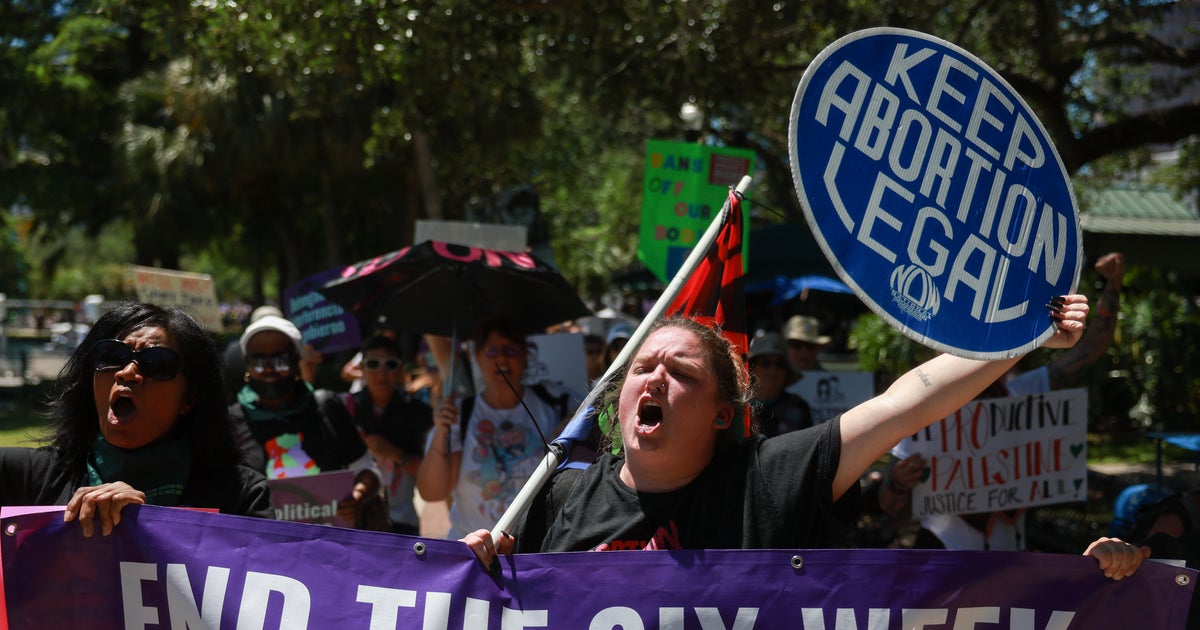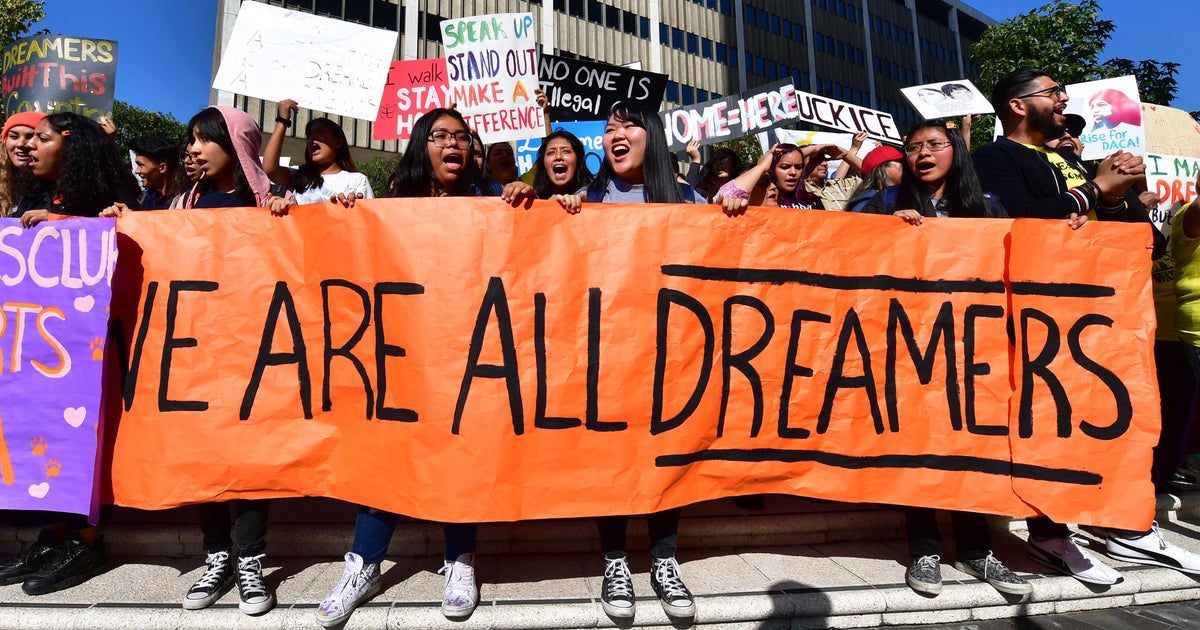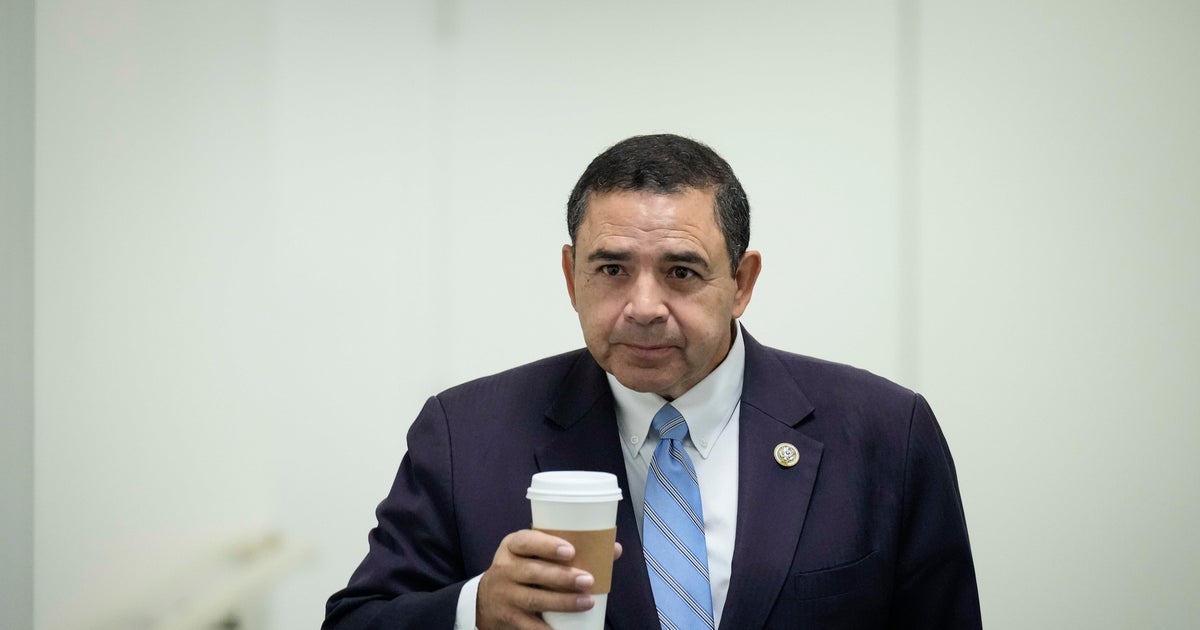Q&A: How contact tracing works, and why it will be key to fighting the coronavirus
Washington — As governors in some states begin rolling out plans to ease restrictions on residents' activities and allow some businesses to open their doors again, experts and state leaders say broad testing is a key step in the road to recovery from the coronavirus pandemic.
But in addition to ramping up testing, public health officials say that a robust contact tracing system will be crucial to allowing Americans to safely get back to work and school.
Some states, like Massachusetts, have begun beefing up their public health workforces to conduct contact tracing and are rolling out their own programs as they look to reopening.
At the federal level, Senator Elizabeth Warren, a Democrat from Massachusetts, and Congressman Andy Levin, a Democrat from Michigan, released a proposal last Thursday for a federal contact tracing program, which they want included in the next emergency relief package from Congress.
More than a dozen public health experts, led by former Acting Administrator for Centers for Medicare and Medicaid Services Andy Slavitt and former Food and Drug Administration Commissioner Scott Gottlieb, sent a letter to congressional leaders Monday recommending they allocate $12 billion to expand the U.S. contact tracing workforce by 180,000. The letter was first reported by NPR.
But what is contact tracing, and how can it prevent the spread of the coronavirus? Dr. Marcus Plescia is the chief medical officer at the Association of State and Territorial Health Officials (ASTHO), a group that represents public health agencies. He contributed to a recent report from ASTHO and Johns Hopkins University outlining a nationwide plan for contact tracing, and spoke to CBS News about how contact tracing could be key to combating the virus. The following transcript has been lightly edited for length and clarity.
CBS News: How does contact tracing work, and why is it important?
Dr. Marcus Plescia: Contact tracing is a core approach to controlling any kind of infectious disease outbreak, and I think contact tracing is particularly important in the case of COVID because across the nation now we have states and communities that are really wanting and needing to move out of these very restrictive strict stay-at-home orders and trying to get society and the economy back going again.
The concerns we have though is that if we start to back out of these stay-at-home orders and other mitigation strategies, the virus is just going to start to spread again as we've recently experienced. We've got to do other things in place of the stay-at-home, stay-away-from-other-people approach.
One thing that's very, very effective is contact tracing. We know this because we've used it effectively in the past but also in the cases of COVID, we've looked at how some other countries who are a little ahead of us on the outbreaks, we've looked at how they've responded to COVID, how they've used contact tracing and disease containment very effectively to keep the numbers down.
So you really can start to reopen and let people move around a little bit more, but you have some way of tracking and tamping down clusters of infections as soon as you identify them.
How it works is, first of all, it requires very aggressive testing. The minute somebody starts to have symptoms that might be consistent with COVID, we want them to be able to be tested, whether that's going to their doctor's office, going out to a testing site in the community, even maybe having somebody come to them.
You identify people who might have COVID very quickly and then you find out who those people have been in contact with in the last two, three, four days and then, it'll further depend on the protocols, but who are their recent contacts who might have gotten sick from being in close contact with them over a recent period?
How does this work in urban areas where people rely on public transportation and are in close quarters with people on the train or subway?
Programs are going to define what they think of as a "close contact" differently. One of the definitions that I've seen is being within six feet of the same person for 15 minutes. I guess if it was really packed on the Metro, but generally people get on and off, generally there's not the same person right next to you. With that kind of movement, then the fact that you're standing very close to somebody from one stop to another and then people shift around, that's probably going to be OK.
It's really more if you got on the Metro and ran into a friend who was going a similar distance and you stood next to each other and kind of talked back and forth to pass the time, that person potentially would be at risk because we know that respiratory droplets can be spread when people are having conversations when they're standing close to each other.
Now, if you're actively coughing or sneezing, then we would hope that if you had those symptoms you would stay at home because it might be COVID. But if the coughing or sneezing cropped up on the Metro, that would be more challenging because that's a more aggressive form of respiratory droplets and more people would get exposed. There are some cases where we just might not be able to track down every person who might be at risk.
But most of it's going to be close contacts. You'll remember that you rode on the Metro with somebody you knew and you were talking to them a couple of days before you got sick, and that's somebody that we would follow up with with the contact tracing.
As we look toward a reopening of the economy, is the U.S. at this point prepared to launch a nationwide contact tracing program?
We're not prepared right at this moment. Our feeling is that we could get this up to scale pretty quickly.
We do contact tracing in all state and local health departments, so we have some core staff who do that, we know how to do it. We have people who can supervise and train other people. And a lot of the basic contact tracing work, you don't have to be a highly qualified public health person. We can hire lay people from communities. We can hire people who are out of work right now who are looking for something else to do.
How many people would need to be hired?
We're estimating 100,000 people across the nation. Our estimates are based on looking at the ratio of contact tracers to population in other countries that have done this effectively.
The most aggressive other nation is Wuhan City in China. If you use their ratio, we would need 300,000 people, so we think that's probably not the level that we're going to operate with.
Is it the responsibility of state and local health departments to hire and pay contact tracers?
We represent state and public health departments, so we really think that's the place to build this capacity. We already have capacity there. We have people who know how to do this, who are experienced. Most importantly, we have the people who can supervise a so-called army of contact tracers. We would have to augment that supervision a little bit but that's probably more modest.
The big hiring would be more in the core contact tracers. But there are other models. There's a model to hire a big national corps that could be sent out. I think there are some logistical problems that would be challenging with that but there's a variety of different ways to do it and maybe ultimately it'll be a hybrid of different approaches.
Do contact tracers require special skills?
Some of it is pretty straight forward. You do have a script with pretty specific questions, but they do need some training. They need training in different ways of finding people because ideally you can call people and get them on the phone and talk to them but that's not always going to work. There are other ways to track people down.
Then they need some skills in basic communication of how to broach this subject with people. When somebody calls you who you don't know, your first reaction is often you're a little suspicious about, is this real or is it a hoax? There's some training to do to that helps people break through that potential barrier and reassure the person they're talking to that this is legitimate and that they need to be attentive so it.
They also need to learn some basic diplomacy, because if I tell that you you ran into somebody and talked to them on the Metro for 15 minutes and now you're going to have to stay at home until you get sick or 14 days pass, you may not be very excited to hear that.
If it's explained well to people and they understand that everybody wants to get this under control, there is a way to convey that so most people will accept it and see it as doing their part. But a contact tracer would need some training to really be good at that particular piece, because ultimately this is really going to depend on people being willing to cooperate. We can't go and force everybody to do this.
Then there are privacy and confidentiality issues. We always want to be clear on that, and so we would spend quite a bit of time training and making sure that the contact tracers understand the ethics of what they're doing and how important it is that you keep people's personal business confidential.
If I'm called by a contact tracer because my friend, for example, had tested positive, what will I be asked?
You would probably be informed that we had been told by a specific person — and we would probably not tell you their name — that we have learned that person has COVID and we have been informed they had some close contact with you. Then we would probably say, here's what this person relayed about the contact the two of you had.
Then we'd want to get your story. The contact tracer will be looking to confirm that the story that we have is consistent with what you've experienced. Then we'd go from there. You'd be asked if you've had any symptoms, you'd be asked who else you've been around.
Ultimately the idea would be to gauge, was this an interaction that put you at significant risk that you might get sick yourself? Most people are going to be pleased to have this information because if they're at risk that they could get COVID, most people want to know that. I think people would cooperate with what we ask them to do, but people would also be concerned about their family and not wanting to expose other people.
You may also have questions about, well, what does this mean, and how likely am I to get sick? The contact tracer will be able to give you some guidance on that as well.
What if I'm the person who tests positive for the virus? Am I responsible for reaching out to the state or local health department, and what can I expect to be asked?
The idea would be to make it as easy as possible to make sure everybody knows, "Here are the symptoms, if you get these, you've got to get a test."
Then when you got tested, they would collect some information from you. Ideally we'll get to a place where we can use these point-of-care tests, where you give the sample and then they can test it almost immediately, so within a few minutes, or 15, 20 minutes you've got the results so you don't go home and wait around for somebody to call you. You can just stay there and you know what the deal is.
If you tested positive, they would probably right then and there try to get the information from you or try to get you on the phone with one of the contact tracers so right away they can get the information from you about who you've been in contact with.
Who you've been in contact with would require you to recall the last three days to really think through, what was I doing those days and who did I spend time around? A good contact tracer would have some questions that would help prompt you to remember things or bring up situations that we often see people in to help prompt their memory. Did you ride on the Metro? If so, were you with any person for a prolonged period of time talking to them?
We would probably want to find out if you were in close contact with anybody who might be at more significant risk if they got COVID. If you were around somebody who is older than 60 or who you knew had chronic medical conditions, those would be particularly important contacts for us to know about so we can keep a very close eye on those people.
In Massachusetts, they are reaching people by phone, while Apple and Google are developing contact tracing technology. Is one better than the other?
In the ideal situation, there would be a mix. There would be some good technology that might do some of the contact tracing without even having to talk to somebody. In other countries, they've been able to use people's cellphones to track. They know Cellphone No. 3 was right next to Cellphone No. 6 for 30 minutes last Friday. There is the capacity to do that. In our society, you would opt-in to that. People aren't just going to start monitoring and following your cellphone. You would have to agree that that is OK.
I think a lot of people would agree with that. People want to get through this. People are willing to pitch in. People want to know if they might have gotten somebody else sick. But there is a big "if" there. People also want their privacy.
With some of the most advanced technological solutions, you can really sort out a lot of who somebody's been in contact with purely through technology. I don't know that we're really in that scenario. I think we're probably in more of a mix, and a lot of the technology would just be about having a data system. So if I collect information about your contacts and then somebody is trying to do some follow-up somewhere else, like when you get tested, that quickly goes into a database that I as the contact tracer can instantaneously see and maybe even react so I can call while you're still there and talk to you.
Is there the possibility for partnership across the levels of government on a strategy for contact tracing?
Yes, there definitely is. I suspect that what we'll end up with is a bit of a hybrid response. I think the federal government is already moving to begin to put together teams of more highly trained people who can help with this — people who have public health backgrounds, who have epidemiology training, who really understand infection control. You don't need a lot of those people. They're really just running the system, but every state and local community is probably going to need a few of those people, and those people are going to be harder to find because they're highly trained.
We at ASTHO think the actual hiring and coordination of this larger workforce that is going to do the contact tracing makes more sense at the state or local level and is built into their existing infrastructure. We want to make use of the infrastructure that's there, and in our nation the public health system is state-based. If you come in with a federal approach, it's just going to be hard to get all that to work in the amount of time that we have.
Has contact tracing been done in the U.S. on this scale before?
We've obviously not seen anything like COVID in this country ever, and who would have ever thought that people would have been asked to and would have complied with staying at home for a month now?
There are a couple of examples. First of all, about a year ago there were these big measles outbreaks in the Pacific Northwest and in New York state. That was all handled through contact tracing. We tamped that down very quickly. It never got out of control. But that was because there was a very good contact tracing system put into place and people identified who might be sick and this whole system fell into place, but in a very defined area.
The other example was the big Ebola outbreak in West Africa. At that point in time we were very concerned because people were still traveling back and forth from Africa to the United States. Every single person who came to the United States from any of those endemic countries, public health departments made contact with and monitored for a period of time to make sure they didn't get sick. That was across the entire nation, those were pretty significant numbers. It definitely taxed the public health system to be able to do that but we pulled it off with the number of people we had.
Now obviously the numbers are way bigger in what we're dealing with now and we're going to have to have more people and train more people, but we're not starting from scratch.
Is there anything else that would be important for readers to know?
Everybody is going to be relieved when some of the social and physical distancing interventions get relaxed. Hopefully states are not going to relax too many things too quickly or we're going to get back into trouble.
The problem is, you finally get back to where you can start doing things that you want to do and the next thing you know, somebody calls you and says, "Were you in contact with so-and-so?" And you're like, "Yeah, we hung out for 45 minutes, we had a really good chat." And then I tell you, "Well, I'm really sorry but you're going to have to remain at home now either until you develop symptoms or you're going to have to just do 14 days to make sure that you don't."
That's going to be hard for people because they think finally they've been able to get back at it. There's going to be a significant number of people who are going to find themselves in that situation. Now, that's better than having everybody stay at home, which is what we're doing now. But people have to get ready for that, because I think for some people, it's going to be very disappointing that they thought they were in the clear and back to normal, and now they're being told, "Well, it's not really any different than it was last week."
I think if people are prepared for that, it will be OK. If that catches people by surprise, that's going to be more challenging.
How do you prepare people for the possibility they may have to quarantine again?
Being very, very clear on what the system is and what it means is helpful for people. Having trusted voices talking about this is helpful.
I think there are a lot of governors and higher level state leadership, a lot of elected officials who gained the public's trust recently. They've really been out there trying to let people know what's going on. Governor [Andrew] Cuomo comes to mind.
If Governor Cuomo says, "Hey, look, we've really got to do this," that's going to be effective. That's one of the things we've really been trying to message is that our leaders — and it doesn't have to be an elected leader, it could be a faith-based leader, it could be your boss who you really respect, but people saying, "We've got to do this and we're in this together," I think that'll really help people a lot.
We started to have some stuff put in place with the congressional acts. People have got to be able to be off work and have something, whether it's unemployment compensation, because otherwise they're stuck at home worried about how they're going to make ends meet. We've got to have unemployment or sick benefits for people, and that's got to be universal. Otherwise you're just asking too much of somebody.
The number one thing here is we want people to stay at home if we think they might have been in contact, but we must have people stay at home when they're sick now.
We're not used to doing that in this country. It's not our social norm. It's almost expected, you're kind of a wimp if you've got a cold and you don't come in. I'm a physician — my profession is one of the worst. There's a very strong peer pressure that you don't not show up, because that means there's somebody else who has to carry the burden. We've got to change that.
If you're sick, we want you to stay at home and we will support you in staying at home. That's the right decision. That's going to require some changes in how we think about things.
